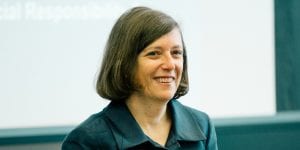Newly accredited School of Business embraces momentum
 By Vicki-Ann Downing
By Vicki-Ann Downing
The Providence College School of Business began the academic year with its long-sought international accreditation in place and a new dean dedicated to advancing its progress.
AACSB International, the Association to Advance Collegiate Schools of Business, awarded the business school accreditation following a meticulous internal review and evaluation accomplished by faculty and administrators. The distinction, considered the “gold standard” for college business programs, is held by only 30 percent of all business schools in the United States and 5 percent worldwide.
It was an achievement for all involved, especially the business school faculty who worked toward it for more than eight years.
“AACSB accreditation involved a significant commitment from School of Business faculty, particularly during the last five years,” said Dr. Patrick T. Kelly, associate professor of accountancy, department chair, and former interim dean of the business school. “Every faculty member was involved in the process, which included service on one or more accreditation-related committees, assessment of student learning, and evaluation of our program.”
The new dean, Dr. Sylvia Maxfield, professor of management, brings a background in both business and higher education. She is a former senior sovereign analyst and vice president at Lehman Brothers and former director of the MBA and Principled Leadership programs at Simmons College. Maxfield holds an elite rank herself — only 18 percent of business schools in the United States were headed by women last year, according to the AACSB.
Maxfield is joined at the administrative level by Dr. Christine E. Earley, professor of accountancy, who this year will be interim associate dean for faculty and curriculum. The school — which is comprised of the undergraduate disciplines in accountancy, finance, management, and marketing, and the graduate-level MBA Program — also plans to add an assistant dean for student affairs and impact assessment.
Great Expectations
Maxfield “has a really good vision of what she wants to do,” said William F. Markey, Jr. ’62, chair of the Business Advisory Council, a group of 50 alumni and business leaders who serve as a resource for the business school. “She’s going to move forward quickly. Dean Maxfield would love to raise the bar and to really be looked at as a top-tier business school with a very solid reputation.”

One of Maxfield’s first goals is to secure the business school a home. A committee of faculty and staff has developed a plan to convert Dore Hall, a residence hall, into a business school.
Group of alumni proposes that Providence College pursue accreditation of its business programs by AACSB International.
“The minute we get a lead gift, we’re ready to go,” said Maxfield. “It’s a wonderful opportunity for a friend of the College to be associated with a business school that over the next five years will be increasingly noted for being unique and creative in integrating the humanities and liberal arts with business education.”
Maxfield also is leading the nationwide search for a professor who will be the first to hold the Michael A. Ruane Endowed Chair for Innovation in Business Education.
Michael A. Ruane ’71, chair of the Board of Trustees, donated $2 million to establish the chair. It will be held by a “passionate and dedicated teacher” at the full- or associate-professor level who will work “collaboratively to support teaching innovation by everyone on the faculty and support learning outcomes,” Maxfield said.
 The College’s new Core Curriculum, which took effect this fall, is an opportunity for the PCSB to further integrate the liberal arts and business, she said.
The College’s new Core Curriculum, which took effect this fall, is an opportunity for the PCSB to further integrate the liberal arts and business, she said.
“Our goal is to have as great a number of students studying as many subjects as possible. We want to build more organic connections to the humanities and the liberal arts,” said Maxfield.
She noted that the revised Development of Western Civilization Program calls for students in the final sequence to consider a contemporary issue and how to apply classical thought to its resolution.
“I’m very hopeful we will be able to have up to 25 percent of our School of Business faculty teaching jointly with humanities faculty in those colloquia,” Maxfield said.
Maxfield said she wants to make sure that business students have the opportunity to study abroad because international travel is an important part of the College’s education.
She also sees an opportunity to highlight the business school’s growing visibility in the area of ethical leadership and social responsibility in finance and accounting.
Susan M. Esper ’91, a member of the Business Advisory Council, said Maxfield has “an extraordinary vision” for the business school.
“To bring together two great things — the Dominican tradition and a liberal arts education — and to be among the very elite group of business schools in the country, you are going to have the best and brightest leaders coming out of campus,” said Esper.
Read how alumni efforts got the accreditation process off the ground.
The decade-long process to achieve accreditation brought its own benefits to the School of Business.
Among them:
- Formation of a business advisory council. Fifty business leaders, many of them alumni, serve on the council, formed in 2009. They support the business school financially, speak on campus, mentor students, and hire recent graduates.
- More students studying business. Between spring 2004 and spring 2012, the number of students majoring in business increased by 20 percent, from 864 to 1,080 students.
- A common core curriculum. Whether majoring in accountancy, finance, management, or marketing, students graduate with a background in each business discipline, with additional instruction in ethics.
- More faculty. The number of faculty also increased between 2004 and 2012, from 35 to 45.
- A strengthened MBA Program. Formerly taught through the graduate school, the MBA Program became part of the PCSB in 2007 and offers individual attention to candidates beginning with the application process.
- Better educational assessment. Business faculty developed new procedures to track student progress and program effectiveness.
MILESTONES IN THE ACCREDITATION JOURNEY
2000: Group of alumni proposes that Providence College pursue accreditation of its business programs by AACSB International.
2004: Board of Trustees establishes Division of Business Administration with Dr. Francine Newth, associate professor of management, as director.
2007: School of Business is established; Newth is acting dean.
2008: Dr. Sue Lehrman appointed first dean of business school.
2009: Business Advisory Council, a group of alumni and business leaders, forms to advise faculty, raise funds, mentor students.
2011: Dr. MaryJane Lenon, associate professor of economics, named interim dean, guiding accreditation process through a critical phase.
April 2012: AACSB team visits PC and evaluates business curriculum, faculty qualifications and scholarship, the M.B.A. Program, and learning assessments.
May 2012: Dr. Sylvia Maxfield appointed dean.
July 2012: AACSB awards accreditation to School of Business.





